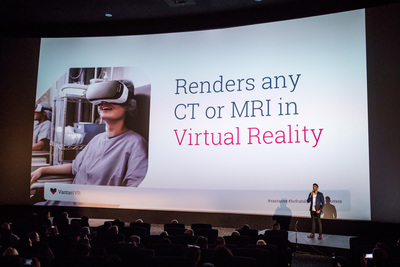Exciting innovation in healthtech

The next generation of healthtech entrepreneurs is developing unique and innovative products, designed to make a difference to the healthcare industry. To help them get their ideas off the ground HCF Catalyst, a health tech accelerator program, is helping start-ups and scale-ups transform their health and wellness ideas into investment-ready businesses. We meet three of the finalists from this year’s program.
Vantari VR
Vantari VR has developed a proprietary imaging tool that utilises virtual reality (VR) to enable new ways to visualise, interpret and understand medical images. It achieves this by pulling together cutting-edge rendering technology to take medical imaging into VR.
Vantari VR delivers value to three key groups across the healthcare value chain, including surgical planning, patient decision-making and medical education.
Inspiration for founders Dr Nishanth Krishnananthan and Dr Vijay Paul came from a deep-seated desire to make an impact, not just on individual patient lives but also on medicine and healthcare delivery as a whole.
Vantari VR can be used by surgeons for diagnostic and surgical planning purposes, allowing them to make informed and strategic decisions based on in-depth understanding and interpretation of medical imaging. Patients benefit from Vantari VR, because its ability to help clinicians decipher often complex medical diagnostic imagery assists them in making empowered decisions about their health, in conjunction with their doctor.
The app also has practical applications in medical education.

Consentic
Developed by Dr Rebecca Saunderson and Dr Julia Rhodes, Consentic’s main aim is to effectively and ethically gain patient consent, which is essential for operations and other invasive procedures.
Both patients and physicians are affected by failures in the medical consent process, and issues pertaining to medical consent are one of the most common legal matters in claims against doctors. Current methods of obtaining informed patient consent have repeatedly been demonstrated to be inconsistent, inadequate and time-consuming. Assessment of patient understanding is rarely formally evaluated, and even when it is, comprehension and retention of the consent process is less than 40%.
Overwhelmingly, the medical literature supports the use of video animations when undertaking informed consent, and Consentic provides this with an interactive step-by-step guide. Consentic believes it is also the first in Australia to capture the consent process electronically, uniquely identifying the patient and linking this information electronically to their consent record.

MEKSI (Medical Knowledge Simulator)
Designed to fortify students’ diagnostic skills, MEKSI was founded by Dr Jawahar Thomas and is a simulation-based online learning portal for medical students and health professionals; MEKSI facilitates consistent, high-quality medical education, giving students the opportunity to develop their skills using simulation-based learning.
Inspired by his experience working as a doctor, Dr Thomas saw a need for sound and effective patient consultation to deliver correct diagnostics and improving patient outcomes, resulting in Thomas developing and patenting the MEKSI Program.
The program allows doctors and students to participate in consultations with simulated patients to create hypothetical scenarios for students to work through in a safe environment. The patient presents with an illness and the student is tasked with providing a diagnosis and treatment plan using the knowledge they have been taught in the classroom in a practical way, helping students to develop their patient consultation skills, knowledge and attitudes, while ensuring patients aren’t put in any genuine risk or harm.

About HCF Catalyst
Now in its third year, the 12-week HCF Catalyst program provides finalists with mentoring, marketing advice and seed funding. Ultimately the HCF program, run in partnership with corporate start-up accelerator Slingshot, teaches finalists how to demonstrate the value of their e-health solution and make their business investor and customer ready. This year’s Catalyst program culminated with a ‘Demo Day’, where participants showcased their business models and progress in the hope of driving interest from investors and partners.
For further information, visit hcf.com.au/catalyst.
View a video summary of last year’s HCF Catalyst Demo Day below.
Australian-first virtual ED marks 500K consultations
This month, the Victorian Virtual Emergency Department — an Australian first —...
Digital Health Festival: transformation through connection
Across two days in May, DHF25 will bring together 8000 attendees, 400 speakers and 200 exhibitors...
Connected care: bridging the gap
With the My Health Record 'Sharing by Default' amendment bill now passed both houses of...









